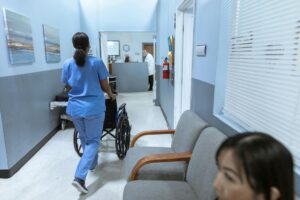This blog post includes perspectives from Dr. Hayder Allkhenfr, Refugee Health Coordinator at the Utah Department of Health; and Henny Ohr, Founder and Executive Director, Ethnic Minorities of Burma Advocacy and Resource Center (EMBARC) Iowa. This blog post accompanies a podcast series on Leading During Times of Transition; click here to access the series and stay tuned for future episodes!
As part of a series of interviews about leadership during transition, I recently spoke with two refugee service leaders about the importance of engaging refugee communities during challenging times. Engaging clients is a key component for success responses, but refugee leaders are often excluded from important parts of developing and executing programs. How can service providers do better? I spoke with Henny Ohr and Dr. Hayder Allkhenfr about how they have successfully worked with refugees in their communities to ensure that programs were accountable to those they wanted to serve.
Time spent engaging with refugee clients and the community is time well spent.
Working with refugee programs over the years, I would often hear managers express a concern about time pressures around engaging refugee clients. Ideas for new programs would be generated away from the refugee communities, not where refugees lived. Managers would acknowledge the importance of involving refugee voices in planning, but be unable to take time out from writing, planning, creating theories of change, etc. to win grants. The grant itself might include community assessments, focus groups, or other activities meant to solicit input. With the contours of the program more or less set, however, the ability of refugees to be fully involved with the program would be lost.
Receiving communities and mainstream resettlement organizations should work with refugee communities to recognize barriers and identify the support that refugees need to actively engage in planning services. This approach requires a sustained effort over time. Taking that time yields greater inclusion and empowerment for the affected communities.
Hold your programs accountable to those they serve.
Many of us have heard the phrase, “nothing about us, without us.” Dr. Allkhenfr discussed the multiple ways he and his colleagues sought to include refugee voices in battling the COVID-19 pandemic. Listening to Utah refugee communities who were disproportionally affected by the disease helped shape effective responses. It became clear that using trusted refugee community voices to deliver messages about testing and the vaccine meant greater community understanding about transmission and better uptake of the vaccine.
In Iowa, Ohr highlighted the importance of relationship building with affected communities. Nurturing relationships helps ensure that refugee needs, more than the receiving communities’ needs, are front and center in developing services. Taking the position that refugees can help themselves if armed with resources means improved results over the whole journey toward community integration.
Organizations should hold themselves accountable for the number of community members who are recruited into decision-making positions. Hiring frontline staff and interpreters, while important, is only one step. Refugee service providers must continue investing in and encouraging the growth of refugee community leadership.
“Inclusion is not just an invitation to the table.” – Henny Ohr
Take advantage of opportunity in the midst of adversity.
COVID-19 forced a level of isolation that initially hindered efforts by state officials and groups like EMBARC to aid refugee communities. Both Ohr and Dr. Allkhenfr pointed to the effectiveness of video conferencing to connect with clients. Again, work had to be done to help refugees help themselves. In Iowa, sustained efforts to teach refugees how to use new technology transformed the ability of women, youth, and others to help each other through peer-to-peer programming. An IT navigator program arose out of the need to connect in new ways and yielded powerful results. A similar peer model was used to develop a 24-hour helpline that helped clients with access to basic services.
Sustained, multi-level support is necessary to develop individual and community leaders.
Leadership development starts with “uplifting community members on their time.” The key elements are familiar: communication, support, mentorship, and social services. EMBARC’s staff is drawn almost exclusively from the community. One success story involved a young woman who joined the organization after graduating high school. With flexible scheduling that allowed her to attend community college and university along with targeted support over time, she gained her degree in social work and is now a program manager.
The rich discussions with these leaders confirmed what many of us know about refugee and community leadership development and engagement. The challenges of this past year required intensified leadership responses, but also offered up opportunities for new and effective programming. For refugee serving providers, it is crucial to commit (or re-commit) to strategies for increasing accountability to communities and to each individual client.
Want to learn more?
Check out these relevant resources:
- Switchboard Toolkit: Leveraging Feedback in Community Engagement
- Switchboard Information Guide: Collecting Client Feedback Data
- Switchboard Information Guide: Demystifying Strengths-Based Services
- IRC: Guidance on Client-Responsive Project Design
- IRC: Client Responsiveness Measurement Framework
Stay tuned for upcoming resources from Switchboard’s certificate course A Client-Responsive Approach to Monitoring and Evaluation!










